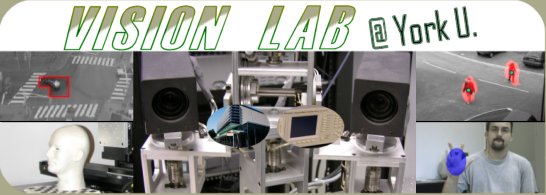Spacetime Structure Grouping Dataset
Konstantinos G. Derpanis and
Richard P. Wildes
Contact email kosta at cse dot yorku dot ca
Department of Computer Science and Engineering
and Centre for Vision Research
York University, Toronto, ON, Canada
Overview
This webpage provides datasets for spatiotemporal grouping. The dataset contains 11 image sequences that depict a wide range of juxtaposed spatiotemporal patterns, including motion, static (stationary texture), pseudo-transparency, translucency, temporal flicker, unstructured and various additional dynamic textures. The image sequences were acquired using a Canon HF10 consumer camcorder with capture rate of 30fps. Each image sequence is provided with a manually constructed groundtruth that delineates boundaries between distinct spatiotemporal regions.
For details of our technical approach to spacetime structure grouping, see our project page.
Examples
| Input | Ground Truth |
 |
 |
Example 1: Tree in foreground (static structure) being coarsely stabilized by moving camera operator with resulting background motion (motion structure).
|
 |
 |
Example 2: A painting (static structure) hanging on a blank wall (unstructured) with a light flickering in an adjacent hallway (temporal flicker structure).
|
 |
 |
Example 3: A duck swimming (motion structure) over turbulent water (dynamic texture structure).
|
 |
 |
Example 4: A person walking behind a fence (pseudo-transparency structure) with a stationary surround of fence, grass and trees (static structure).
|
Download
Related Papers
- K.G. Derpanis and R.P. Wildes, Detecting Spatiotemporal Structure Boundaries: Beyond Motion Discontinuities, In Proceedings of the Asian Conference on Computer Vision, to appear, 2009.
- K.G. Derpanis and R.P. Wildes, Early spatiotemporal grouping with a distributed oriented energy representation, IEEE Conference on Computer Vision and Pattern Recognition (CVPR), 2009.
- R.P. Wildes and J.R. Bergen, Qualitative spatiotemporal analysis using an oriented energy representation, European Conference on Computer Vision (ECCV), pp. 786-784, 2000.
Last updated: July 28, 2009.
|



